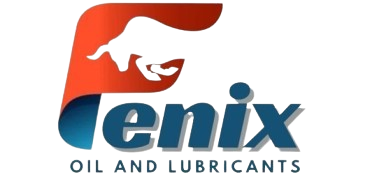Greases
MULTIPURPOSE GREASE
INDUSTRIAL GREASES
Multipurpose Lithium Grease
Description
NLGIGrade: 3.”GB-LB” Rating. Also available in NLGI Grade 2
Base Type: Lithium
Colour: Amber
Dropping Point: 200°C (+392°F)
Operating Temperature Range: -20°C to +130°C (-4°F to +266°F)
DIN: 521502 KPK-20
Specification
Roll bearings and elements of passenger cars, heavy road transport vehicles, construction ma- chinery, cranes, electronic motors and blowers, axle bed of diesel/electric locomotive bearings. Also used in chassis, farm equipments and general purpose machinery.
EP Grease
Description
NLGIGrade: 2. “GB-LB” Rating. Also available in NLGI Grade 13
Base Type: Lithium
Colour: Amber
Dropping Point: >190°C(+374°F)
Operating Temperature Range: -20°C to +120°C (-4°F to +248°F)
DIN: 521502 KP2K-20
Specification
Heavy duty plan and rollingelement bearings of industrial machinery & heavy engineering equipments. Prevents rust and corrosion for metal to metal contact area, heavy loads and pressure application.
Premium Li-Com Grease
Description
NLGIGrade: 2. GC-LB Rating. Also available in NLGI Grade1&3
Base Type: Lithium Complex
Colour: Blue
Dropping Point: >260°C(+500°F)
Operating Temperature Range: -20°C to +160°C (-4°F to +320°F)
DIN: 51502 KP2K-20
Specification
Chassis and disc drum brake wheel bearing of heavy duty commercial vehicle like trailers, trucks, buses,tankers,highway transport vehicles, passengercars. Alsorecommended for gear coupling, electric motors, blowers and general industrial machinery.
EP Grease 0
Description
NLGIGrade: 0. GC-LB Rating. Also available in NLGI Grade
Base Type: 0&00. Lithium
Colour: Amber
Dropping Point: >160°C (+320°F)
Operating Temperature Range: -10°C to +120°C (-14°F to +248°F)
DIN: 51502 OGP0K-20
Specification
Centralised lubricating system of industrial & mining equipments. Also used in gear boxes, open gears and gear couplings.
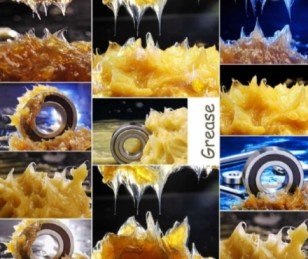
Multipurpose Grease is premium quality multipurpose automotive greases based on lithium soap. Recommended for all classes of service in automotive lubrication.
1. High drop point
2. Good thermal stability
3. High degree of resistance to oxidation
4. Protection against rusting & corrosion
GEAR OILS
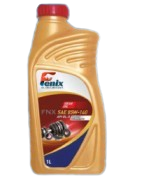
85W140
Description
FNX Gear 85W140 is a highperformance Gear Oil designed to
provide maximum protection to
heavily loaded gears while
maximizing power throughout the
drive train. It is designed for use in
heavy-duty drive trains that require
gear lubricants with relatively high
viscosity and excellent load-carrying
capability and where extreme
pressure and shock loading are
expected.
Specification
API GL5
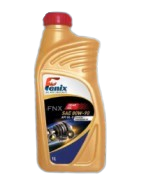
80W90
Description
FNX Gear 80W90 is a highperformance Gear Oil designed to
provide maximum protection to
heavily loaded gears while
maximizing power throughout the
drive train. It is designed for use in
heavy-duty drive trains that require
gear lubricants with relatively high
viscosity and excellent load-carrying
capability and where extreme
pressure and shock loading are
expected.
Specification
API GL5
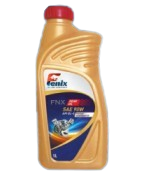
SAE90
Description
FNX SAE 90 is developed to
withstand high loads and repeated
shock-load conditions. Also ideal for
conventional differentials and
vehicles that operate under heavyduty conditions such as 4×4, Towing,
or carrying heavy loads. FRV OILS
SAE 90 is suitable for use where API
GI-4 or GI 6 (obsolete) is
recommended. FRV OILS SAE 90 is
formulated using the synergy of high
viscosity base fluids with an
extreme pressure additive system
Specification
API GL5
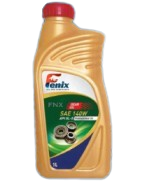
75W-140
Description
FNX Gear Oil 75W-140 formulated
for ultimate protection and
performance and increases lubricity
and ensures less gear noise and
longer bearing life. It is designed to
operate and protect in both high and
low extreme temperature
conditions.
Specification
API GL5
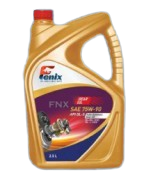
75W90
Description
FNX Gear 75W 90 Gear Oil is extreme
Pressure Premium Gear Oil that
provides smoother shifting in cold
temperatures. It helps reduce
gearbox noise and control idle rattle
at higher operating temperatures.
This fluid is recommended for
modern vehicles with manual
transmission and can also be used
where automatic transmission
fluid is recommended.
Specification
API GL5
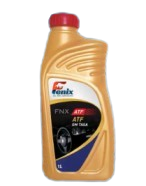
Description
FNX Transmission Fluid ATF-DexronIII formulated for ultimate protection and performance and increases lubricity and ensures less gear noise and longer bearing life. It is designed to operate and protect in both high and low extreme temperature conditions.
Specification
API GL5
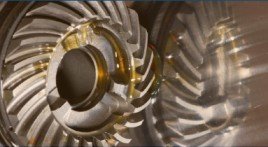
Premium high performance multigrade
gear oil for hypoid gear differentials,
mechanical transmissions of cars, light
and heavy commercial vehicles
AUTOMOTIVE GREASE
AUTOMOTIVE GREASES
Grease 100-K, NLGI-3
Description
FNX Grease 100-K is an extended service lithium complex grease intended for a wide variety of applications and severe operating conditions. This grease was designed to outperform conventional products by applying cutting-edge, proprietary, lithium complex manufacturing technology.
Grease 100-K, NLGI-3 Grease 40-K, NLGI-3 K100 grease is formulated to provide excellent high temperature performance with superb adhesion, structural stability and resistance to water contamination. It has a high level of chemical stability and offers excellent protection against rust and corrosion.
Temperature ranges from -30°C to +220°C. K100 grease is designed for a wide range of applications, including the industrial, automotive, construction and marine sectors. Its performance features make it an ideal choice for operating conditions including high temperature, water contamination, shock loading and extended re-lubrication operations.
Grease 40-K, NLGI-3
Description
FNX Grease 40-K Bearing grease is transparent lithium soap grease, produced from selected base materials and advanced additives. It provides proper lubrication to normally loaded roller and plain bearings at normal to high speeds. Also under damp and dusty operating conditions.

Automotive Greases :
Our Automotive Greases Protect against corrosion, reduce friction and good rust protection. It also sustains a high temperature up to 200C. FNX’s automotive range has demonstrated to be reliable performance accompaniments for the diverse and critical requirements of the automotive industry.
FNX Automotive Greases contains special additives that ensure optimum protection against wear, oxidation, and rust resulting in the long life of all the mechanisms in all the applications.
Benefits of Grease Lubricants
Grease lubricants are a type of lubricant that consist of a thick, semi-solid substance mixed with oil. This unique composition allows grease to adhere to surfaces and stay in place for extended periods, providing long-lasting lubrication. Unlike liquid lubricants, such as oil, grease lubricants do not easily flow or drip, making them ideal for applications where constant lubrication is required.
Reduced Friction and Wear
One of the primary benefits of using grease lubricants is their ability to reduce friction between moving parts. Friction is a natural occurrence when two surfaces come into contact, and it can lead to excessive heat generation and wear. By applying grease to these surfaces, the lubricant forms a protective layer that minimizes direct contact and reduces friction. This, in turn, helps to prevent premature wear and tear, extending the lifespan of the machinery or equipment.
Excellent Sealing Properties
Furthermore, grease lubricants offer excellent sealing properties, making them effective in preventing the entry of contaminants such as dust, dirt, and moisture. The thick consistency of grease helps to create a barrier, sealing gaps and preventing these harmful substances from infiltrating the machinery. This is particularly important in harsh environments or applications where equipment is exposed to extreme temperatures or high levels of humidity.
Superior Load-Carrying Capabilities
Grease lubricants also provide superior load-carrying capabilities, making them suitable for heavy-duty applications. The thick nature of grease allows it to withstand heavy loads and provide reliable lubrication, even under extreme pressure. This makes grease lubricants the preferred choice for machinery and equipment that operates under demanding conditions, such as industrial machinery, automotive components, and construction equipment.
Resistance to Water Washout
Another advantage of using grease lubricants is their ability to resist water washout. Water washout occurs when water displaces the lubricant, leading to inadequate lubrication and potential damage to the machinery. Grease lubricants, with their thick consistency, are designed to resist water washout, ensuring that the lubrication remains in place even in wet or humid environments.
Corrosion Protection
Another advantage of grease lubrication is its ability to provide corrosion protection. The thick consistency of grease forms a barrier that prevents moisture and oxygen from reaching the metal surfaces, reducing the risk of rust and corrosion. This is particularly important in marine environments or in equipment exposed to water or humid conditions.
Shock Absorption
Grease lubricants have excellent shock-absorbing properties, making them ideal for applications where impact or vibration is a concern. The thick and viscous nature of grease helps to cushion and dampen the effects of sudden movements or vibrations, protecting the equipment from damage.
Versatility
Grease lubrication is highly versatile and can be used in a wide range of applications. It is suitable for both slow-speed and high-speed machinery, as well as for various types of equipment, including bearings, gears, chains, and slides. Grease can also be formulated to meet specific requirements, such as extreme temperatures, high loads, or compatibility with different materials.
Environmental Friendliness
Compared to some other lubricants, grease is more environmentally friendly. It has a lower risk of leakage or spillage, reducing the potential for soil or water contamination. Additionally, grease can be formulated with biodegradable materials, making it a more sustainable choice.
Factors to Consider in Choosing Grease Lubricants
Application Method
Another important factor to consider when choosing the right grease lubricant is the method of application. Some greases are designed to be applied manually using a grease gun, while others are suitable for automatic lubrication systems. Consider the ease of application and the equipment available for applying the grease.
Maintenance Schedule
Take into account the maintenance schedule of your equipment when selecting a grease lubricant. Some greases have longer service intervals, while others may require more frequent reapplication. Consider the time and resources available for maintenance to ensure that the chosen grease aligns with your maintenance schedule.
Industry Standards and Recommendations
Consult industry standards and recommendations when choosing a grease lubricant. Different industries may have specific requirements or guidelines for lubrication. It is important to ensure that the selected grease meets these standards to ensure optimal performance and compliance.
Cost and Availability
Consider the cost and availability of the grease lubricant. While it is important to select a high-quality grease, it is also necessary to consider the budgetary constraints. Additionally, ensure that the chosen grease is readily available to avoid delays in maintenance or repairs.
Manufacturer Support
Look for a grease lubricant from a reputable manufacturer that offers technical support and expertise. Having access to manufacturer support can be beneficial when troubleshooting issues or seeking guidance on the best lubrication practices for your specific application.
Proper Application of Grease Lubricants
Consistent Application
When applying grease, it is important to ensure a consistent and even distribution across the surfaces to be lubricated. This can be achieved by using the appropriate tools, such as a grease gun or brush, and applying the grease in a controlled manner.
Consider Temperature
Take into account the operating temperature of the equipment when selecting a grease lubricant. Different greases have varying temperature ranges, and using the wrong grease can result in poor lubrication and potential damage to the components.
Follow Manufacturer’s Recommendations
Always refer to the manufacturer’s guidelines and recommendations for the specific equipment and grease lubricant being used. They will provide valuable information on the application process, reapplication intervals, and any specific considerations for the equipment.
Monitor Performance
Regularly monitor the performance of the lubricated components to ensure that the grease is providing effective lubrication. Look for signs of excessive wear, overheating, or abnormal noise, as these may indicate the need for adjustments or reapplication of the grease.
By considering these factors and following proper application guidelines, you can choose the right grease lubricant and ensure optimal performance, longevity, and efficiency of your equipment.

